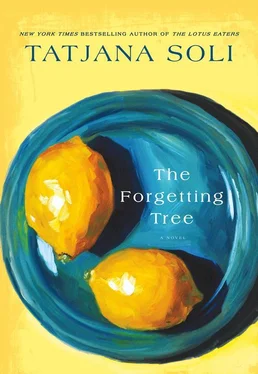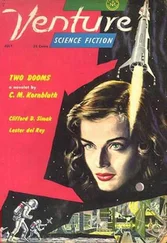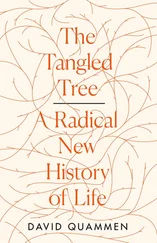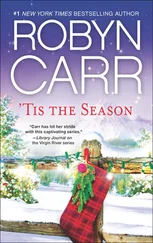Nothing to put in the armoire’s place, but she replaced the bombé chest with a frail pine cabinet from a bedroom. She put back the picture frames and lamp in the exact same positions they stood on the chest, but it was a poor replication. The albums and tablecloths from the drawers she crammed on the single exposed shelf. When the cabinet could not hold another thing, she put the rest in paper bags.
Most were things Claire couldn’t miss: faded ribbons that had never been used to decorate birthday presents; a shot glass with the name of a town in Mexico and an agave plant painted on its side; a salt-and-pepper set embossed with a bronc-riding cowboy on each egg-shaped cylinder; pads and pads of paper with the names of real estate companies printed along the top. Why keep a calendar a decade old with pictures of kittens and beaches and a California poppy unfurled, its petals like the skirts of a dancer? Claire hoarded for a time of need that never came.
Marie thumbed the albums that contained everything expected with the raising of two daughters. She felt a stab inside her, wishing that she had been that family. How was it that an accident of birth caused happiness, or its opposite? Why shouldn’t it be her and her maman in those pictures? No possibility that Claire would be found a victim in the iron forest, or that Gwen and Lucy would ever have been restavek . Even the loss of the boy would have had to be shrugged off to survive back home. Injustice an everyday happening. Marie closed her eyes and swallowed the bitter that would otherwise overwhelm her.
She laughed at the jauntiness of a young Claire, chin jutted out at the world. She did have spunks then. A Claire long gone before Marie arrived. Was it the losing of her boy that changed her? In a wooden box like a treasure chest was a handful of old photos. A scrappy boy stood perched in the dark sunlight of each picture, white-blond hair and tanned face, the matching mischief of his young mother’s eyes, the same jut chin. In Marie’s favorite, he wrapped a wiry arm around Claire’s neck as if consoling her for soon leaving. Joshua. Marie looked closer, but there was no sign he knew his fate.
At the bottom of the chest was a manila envelope softened by age, full of folds, with a singe name, Hanni. Inside were pamphlets to such places as Spain, Bora-Bora, Thailand, and Paris. Some of them dog-eared from having been looked at many times, but none were written on. Most of them new as if they had been buried before they were ever considered. She found a picture of white people in Martinique drinking cocktails from glasses bristling with umbrellas. The women had hairdos from the fifties, and big, rounding skirts, and pump shoes shaped like boats. She read the prices and realized it was a trip no longer possible to take because now it was more a journey in time than place.
When Claire came home from her lunch with Forster, she paused where the bombé chest used to stand. A thrill of scare went through Marie at the prospect of being caught at last, but then Claire, deep in thought — resigned? — laid down her purse on the pine cabinet and moved on to the living room.
* * *
Claire always wanted Marie to talk, but she wanted to hear what she already imagined. Marie was supposed to speak in postcard descriptions: fiery sunsets, silky white beaches, smiling black faces. Already Claire’s mind was filled up and rejected what wasn’t already there. Something in Marie wanted to break that, push out the ugly, bloody, squalling truth. Wanted to talk about the heat and the flies, the violence, the shit and the dirt. The stuff they didn’t tell on pretty travel brochures of spiky cocktail glasses and women in boat-shaped shoes. How hard the earth floor was, how loud the shanties were with hunger, how heavy a grown man laid on a young girl’s bones. Favorite food? Any, when the norm was starvation. Marie wanted to lay the mewling thing, truth, at Claire’s feet.
Instead: “The flowers are big, big as your outspread hand.”
“Oh,” Claire said, pleased.
Marie hated her those moments, felt cold inside, like seducing a man one didn’t love. “Oh, Agatha, you’re just wanting to be charmed, aren’t you?”
“‘Agatha’? Why are you calling me that?”
Marie frowned, not about to tell her that renaming took away one’s soul. “Don’t you remember, doudou ? The patron saint of breasts? I’m giving you her powers.”
“I don’t like it.”
“They only mention Rhys’s marriages in the biographies. They don’t tell how she abandoned her children. No one wants to hear the less than pretty details. What if my great-grandmother lost her husband when she was still a young wife? Very hush-hush. And she goes to hide on the other side of the island? What if she is killed? The baby left alone to be raised by distant family. Doesn’t make a very good story, does it?”
“No.” Claire seemed disappointed. The bitter of the world too much for her.
“The biographies don’t tell that she was a selfish woman, that she never looked back, never thought of her baby girl again. That she wasn’t mother material. They want to make her all romantic-seeming. Poor, dreaming Agatha. In love with a ghost.”
“Stop calling me that!”
“What if my grandmother married a black man, and my father married a black woman. Only a small bit of Rhys blood left. But in your eyes, I’m all her.”
Marie could tell Claire didn’t like these answers. And just like that, the truth urge went stillborn. Marie would not disappoint again. The habit of story was stronger in her. She was used to begging for her supper this way.
“But you have your great-grandmother’s eyes. And the same set of the mouth,” Claire said. Stubborn, like a child. “I looked at her pictures.”
“I wish I had her money, too.”
Claire laughed, both of them relieved.
* * *
They were sweeping up the ash from the fires off the back patio when a fireman in yellow gear walked around the side of the house, startling them. He looked like the man on the moon, squeaking rubber with each step, arms angled forty-five degrees out from the bulky trunk of body. For a moment, all three froze at the unexpected sight of each other.
“Excuse me,” he said finally. “We’re checking fire hazard at all the area homes.”
Marie wore a crocheted tank top, bare underneath. His eyes hovered at her bulging middle, not daring to look up, not trying to look away.
“We weren’t hoping for visitors,” she said.
“The place looks boarded up from the road,” he said. “Abandoned.”
Claire coughed, and he slowly moved his glance from Marie’s stomach to Claire’s face.
“We were worried about looters,” she said. “We belong here.”
“Incendiary. You have a lot of burned trees that need to be removed.”
“That’s true.”
He kept staring at Claire as if she might be in need of rescue. She did look pale and sweat-soaked in the harsh light. “Excuse me, ma’am, but are you okay?”
“I have cancer.” Claire was thinking that was now a lie; the cancer now an excuse. She was cured.
“Oh, I’m sorry—” His reddish skin turned a dark brick shade.
“That was a good one,” Marie said. “Real smooth.”
“It’s my job,” he mumbled.
“Agatha and I are just fine,” Marie said, watching Claire flinch just the smallest bit, as if she had been pinched in secret. “Snug as bugs in a rug.”
“No offense taken, Officer,” Claire said. “My name is—”
“Baumsarg it says here. Agatha?”
“No!”
“Can we offer you a glass of water,” Marie interrupted as she pulled a T-shirt over her head.
“No, thank you,” he answered. “I won’t take up any more of your time.”
Читать дальше












